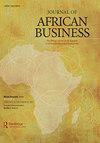环境困境?肯尼亚公司利益相关者参与的阐释
IF 1.8
Q3 BUSINESS
引用次数: 1
摘要
利益相关者的压力是促使企业采用环境管理实践的途径之一。由于发展中国家背景下的研究很少,而且总体上没有结论性,本研究调查了模仿、规范和强制压力(包括利益相关者的压力)是否会影响企业采用资源管理和能源效率。使用简单的probit模型对肯尼亚852家公司的数据进行分析表明,所有三种类型的利益相关者压力都对企业资源管理和能源效率产生了积极影响。这增强了我们对利益相关者和新制度理论的假设。基于这些发现,可以将利益相关者视为促进发展中国家企业可持续发展举措的关键“工具”。本文章由计算机程序翻译,如有差异,请以英文原文为准。
Environmental Dilemma? Explicating Stakeholder Engagement in Kenyan Firms
ABSTRACT Stakeholder pressure is among the pathways through which firms are being prodded to adopt environmental management practices. Owing to research paucity from the context of developing countries and overall inconclusiveness, this research investigates whether mimetic, normative, and coercive pressures (which encompass stakeholder pressure) sway firms into adopting resource management and energy efficiency. An analysis of data from 852 firms in Kenya using a simple probit model, suggests that all the three types of stakeholder pressure positively influenced corporate resource management and energy efficiency. This augments our postulations on both stakeholder and neo-institutional theories. Based on these findings, it is plausible to view stakeholders as critical ‘tools’ that can foster corporate sustainability initiatives in developing countries.
求助全文
通过发布文献求助,成功后即可免费获取论文全文。
去求助
来源期刊

Journal of African Business
BUSINESS-
CiteScore
4.60
自引率
10.50%
发文量
36
期刊介绍:
Journal of African Business is the official journal of the Academy of African Business and Development, the largest network of professionals committed to advancement of business development in African nations. JAB strives to comprehensively cover all business disciplines by publishing high quality analytical, conceptual, and empirical articles that demonstrate a substantial contribution to the broad domain of African business. Regardless of the research context, tradition, approach, or philosophy, manuscripts submitted to JAB must demonstrate that the topics investigated are important to the understanding of business practices and the advancement of business knowledge in or with Africa. Particularly, JAB welcomes qualitative and quantitative research papers. JAB is not, however, limited to African-based empirical studies. It searches for various contributions, including those based on countries outside Africa that address issues relevant to African business. Targeted toward academics, policymakers, consultants, and executives, JAB features the latest theoretical developments and cutting-edge research that challenge established beliefs and paradigms and offer alternative ways to cope with the endless change in the business world. Covered areas: Accounting; Agribusiness Management and Policy; Business Law; Economics and Development Policy; Entrepreneurship and Family Business; Finance; Global Business; Human Resource Management; Information and Communications Technology (ICT); Labor Relations; Marketing; Management Information Systems (MIS); Non-Profit Management; Operations and Supply Chain Management; Organizational Behavior and Theory; Organizational Development; Service Management; Small Business Management; Social Responsibility and Ethics; Strategic Management Policy; Technology and Innovation Management; Tourism and Hospitality Management; Transportation and Logistics
 求助内容:
求助内容: 应助结果提醒方式:
应助结果提醒方式:


